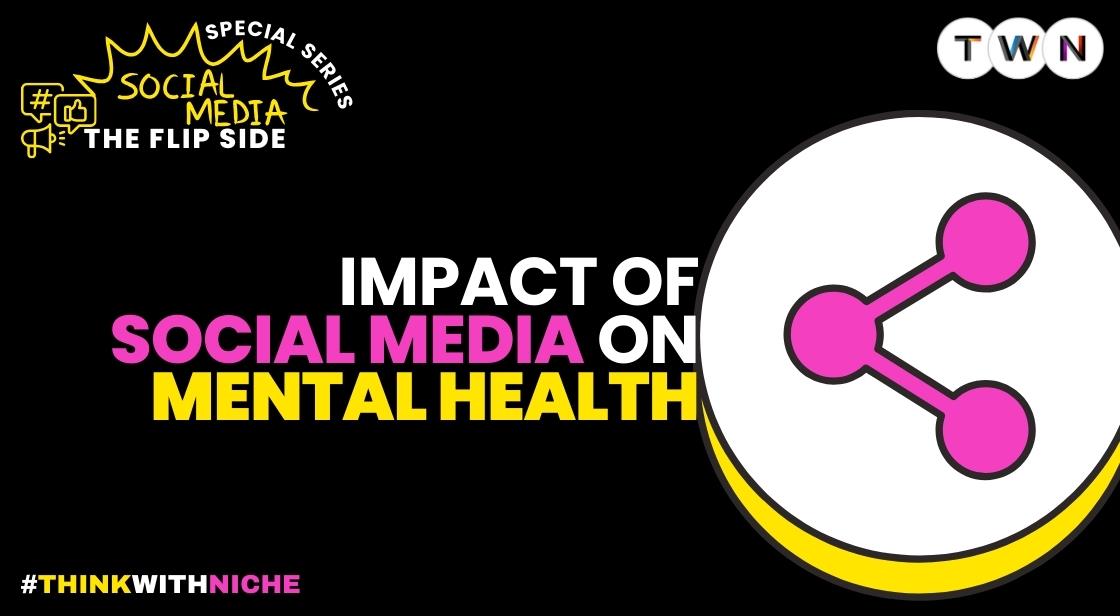The Impact of Social Media on Mental Health: Finding Balance in a Digital World

Blog Post
In today's interconnected world, social media has become a ubiquitous part of our daily lives, revolutionizing the way we communicate, share information, and engage with others.
Platforms like Facebook, Instagram, Twitter, and TikTok offer endless opportunities for connection and self-expression, allowing us to stay in touch with friends and family, follow global events in real time, and discover diverse perspectives. But this digital revolution also brings with it a new set of difficulties, especially in terms of mental health.
Research increasingly highlights the complex relationship between social media use and mental well-being. On one hand, social media can foster a sense of community, provide emotional support, and promote positive mental health through uplifting content and inspiring stories. On the other hand, excessive or unregulated use can lead to adverse effects such as anxiety, depression, and feelings of loneliness and inadequacy.
The constant comparison with others' curated lives, the pressure to maintain a perfect online persona, and exposure to cyberbullying and negative content can significantly impact one's self-esteem and overall mental health.
Finding balance in this digital age is crucial. By adopting a mindful approach to social media use, setting clear boundaries, and curating our online experiences to align with our values and well-being, we can harness the benefits of these platforms while mitigating their negative impacts.
Striking a balance between our online presence and offline interactions is essential for maintaining a healthy, fulfilling relationship with the digital world, ensuring that social media serves as a tool for connection and inspiration rather than a source of stress and comparison.
Transforming Social Media Habits for Better Mental Health
In the 21st century, social media has become an integral part of daily life for billions of people worldwide, revolutionizing communication, networking, and information dissemination. Platforms like Facebook, Instagram, Twitter, and TikTok have transformed the way individuals interact, share experiences, and consume content. However, alongside its undeniable benefits, the pervasive influence of social media has raised significant concerns regarding its impact on mental health.
The Rise of Social Media
Social media platforms have experienced exponential growth over the past two decades, with users spending increasing amounts of time scrolling through feeds, posting updates, and engaging with online communities. The accessibility and convenience of smartphones and internet connectivity have facilitated this phenomenon, enabling people to stay connected around the clock.
The Influence on Mental Health
Despite its initial promise of fostering connections and enhancing communication, social media's impact on mental health has come under scrutiny in recent years. Studies have highlighted various negative consequences associated with excessive social media use, including heightened feelings of loneliness, depression, anxiety, and low self-esteem.
The curated nature of social media content, characterized by carefully selected photos, filtered images, and highlight reels of life's moments, can create unrealistic expectations and foster a culture of comparison. Users may feel pressured to present an idealized version of themselves, leading to feelings of inadequacy when comparing their lives to those portrayed online.
Furthermore, the constant exposure to social media can disrupt sleep patterns, increase stress levels, and contribute to a phenomenon known as "information overload," where individuals feel overwhelmed by the sheer volume of content and notifications vying for their attention.
Growing Concerns and Public Discourse
As the negative effects of social media on mental health become more apparent, there has been a growing outcry from psychologists, health experts, and concerned individuals. Parents, educators, and policymakers are increasingly recognizing the need to address these issues and implement measures to promote healthier digital habits among users, particularly young people who are more susceptible to the influence of social media.
Also Read: The Rise of AI in Mental Health: Transforming Diagnosis, Treatment, and Prevention
The Positive Effects of Social Media
1. Connection and Community Building: Social media platforms serve as virtual meeting places where individuals from diverse backgrounds and geographical locations can connect and interact.
For example, platforms like Facebook, Twitter, and LinkedIn allow users to stay in touch with friends, family, and colleagues, regardless of physical distance. These connections foster a sense of belonging and community, which can enhance mental well-being by reducing feelings of isolation and loneliness.
2. Enhanced Communication: Social media has revolutionized the way people communicate, enabling instant sharing of thoughts, ideas, and experiences with a global audience.
Platforms like Instagram and Snapchat facilitate visual communication through photos and videos, while Twitter and Facebook offer platforms for sharing news, opinions, and updates. This accessibility and immediacy of communication can strengthen relationships, foster collaboration, and provide emotional support during challenging times.
3. Information Access and Knowledge Sharing: Social media serves as a vast repository of information on a wide range of topics, from news and current events to educational resources and tutorials.
Platforms like YouTube, Reddit, and Quora provide access to tutorials, how-to guides, and expert advice, empowering users to learn new skills and expand their knowledge base. This democratization of information promotes lifelong learning and personal growth, contributing to overall mental well-being.
4. Support Networks and Advocacy: Social media has facilitated the formation of online support communities where individuals facing similar challenges can connect, share experiences, and offer mutual support.
For instance, platforms like Reddit host communities dedicated to mental health, chronic illnesses, and recovery from addiction, providing a safe space for individuals to seek advice, encouragement, and solidarity.
Additionally, social media allows individuals to amplify their voices and advocate for causes they care about, fostering a sense of empowerment and social responsibility.
5. Creativity and Self-Expression: Social media platforms provide creative outlets for self-expression and artistic endeavors. Whether through blogging, vlogging, photography, or music sharing, users can showcase their talents and passions to a global audience.
Platforms like TikTok and Pinterest encourage creativity through user-generated content, inspiring others and fostering a sense of connection through shared interests.
The Negative Effects of Social Media
Comparison and Self-Esteem Issues
Excessive social media use often leads to comparison with others, which can significantly impact self-esteem. Social media platforms like Instagram and Facebook are filled with curated images and posts that highlight the best moments of people's lives.
According to a study by the Royal Society for Public Health, 70% of young people reported feeling worse about their appearance after spending time on social media. This constant comparison can lead to feelings of inadequacy and low self-worth, as individuals measure their own lives against the seemingly perfect lives of others.
Cyberbullying and Online Harassment
Cyberbullying and online harassment are serious issues exacerbated by social media. The anonymity and reach of these platforms can embolden bullies, leading to severe emotional and psychological distress for victims.
A study by the Pew Research Center found that 59% of U.S. teens have experienced some form of cyberbullying. The impact of such harassment can include depression, anxiety, and even suicidal thoughts. The relentless nature of online harassment means victims often struggle to find a safe space, as the abuse can follow them everywhere via their devices.
Fear of Missing Out (FOMO) and Anxiety
The fear of missing out (FOMO) is a common consequence of social media use, leading to heightened anxiety. Users frequently see posts about events, gatherings, and experiences that they were not a part of, which can foster feelings of exclusion and anxiety.
A study published in the Journal of Social and Clinical Psychology found that limiting social media use to 30 minutes per day significantly reduced FOMO and loneliness, highlighting the link between social media and anxiety.
Addiction and Dependency
Social media platforms are designed to be addictive, with features like endless scrolling and notifications triggering dopamine releases in the brain. This can lead to dependency, where individuals feel compelled to check their accounts repeatedly throughout the day.
Research from the University of Chicago has shown that social media can be more addictive than cigarettes and alcohol. This dependency can interfere with daily activities, relationships, and overall mental health.
Distraction and Decreased Productivity
The constant notifications and the temptation to check social media can lead to significant distraction and decreased productivity. A study by Microsoft found that the average human attention span has decreased to eight seconds, partly due to the constant interruptions from social media.
This lack of focus can impact academic and professional performance, as well as personal relationships.
Sleep Disturbances
Excessive social media use, particularly before bedtime, can lead to sleep disturbances. The blue light emitted by screens interferes with the production of melatonin, a hormone that regulates sleep.
According to research published in the Journal of Youth and Adolescence, 70% of adolescents report inadequate sleep due to social media use. Poor sleep can exacerbate issues like depression, anxiety, and overall mental health.
Vulnerability Factors
Adolescents and Young Adults
Particularly susceptible to the detrimental impacts of social media are teenagers and young adults. This age group is at a critical stage of identity formation and self-esteem development.
Constant exposure to idealized images and peer comparisons can exacerbate insecurities and contribute to issues such as anxiety, depression, and body image disturbances. The need for social validation during these formative years makes them more susceptible to the addictive aspects of social media.
Elderly The elderly may also face unique challenges with social media use. They may struggle with adapting to rapidly changing technologies, leading to feelings of frustration or exclusion.
Additionally, older adults who lack strong offline support networks might rely heavily on social media for social interaction, which can lead to increased feelings of loneliness if their online interactions are superficial.
Pre-Existing Mental Health Conditions
Depression and Anxiety Individuals with pre-existing mental health conditions, such as depression and anxiety, are more likely to experience exacerbated symptoms due to social media use.
Negative feedback or lack of engagement on posts can reinforce feelings of worthlessness and loneliness. Moreover, the constant barrage of distressing news or cyberbullying can intensify anxiety symptoms.
Body Dysmorphic Disorder (BDD) Those with body dysmorphic disorder (BDD) may find social media particularly harmful. The prevalence of edited and filtered images can deepen preoccupations with perceived physical flaws, leading to increased dissatisfaction and compulsive behaviors aimed at achieving unrealistic standards of beauty.
Personality Traits
Neuroticism Individuals high in neuroticism tend to experience negative emotions more intensely and frequently. Social media can amplify these feelings by exposing them to triggering content, such as posts about personal successes or life events that provoke envy and self-doubt. Their sensitivity to criticism can also make negative comments or lack of social media interaction particularly damaging.
Introversion Introverts, who may already find social interaction challenging, might use social media as a substitute for face-to-face connections. While this can provide a sense of connection, it can also lead to social withdrawal and increased reliance on virtual interactions, which may not provide the same emotional fulfillment as real-life relationships.
Recognizing and Mitigating Vulnerability
Recognizing one’s own susceptibility to the negative effects of social media is crucial for mental well-being. Individuals should regularly assess how social media use impacts their emotions and behaviors. Proactive steps to mitigate potential harm include:
-
Setting Boundaries: Limiting daily social media use and designating specific times for checking platforms can prevent overuse and reduce exposure to harmful content.
-
Curating Content: Following accounts that promote positivity and unfollowing those that trigger negative emotions can help create a healthier online environment.
-
Practicing Digital Detoxes: Periodic breaks from social media can help reset one’s mental state and reduce dependency on digital interactions for validation.
-
Seeking Support: Engaging in therapy or support groups can provide strategies for managing the impact of social media on mental health and offer a space to discuss concerns.
By understanding vulnerability factors and taking deliberate actions to manage social media use, individuals can protect their mental health and foster a more balanced relationship with digital technology.
Also Read: World Mental Health Day 2023: Teenagers and the Impact of Screen Time
Finding Balance: Strategies for Healthy Social Media Use
Setting Limits on Screen Time
One of the most effective ways to maintain a healthy relationship with social media is to set clear limits on screen time. This can be achieved through built-in features on smartphones and apps that track and limit usage.
For instance, setting daily limits for specific apps or using tools like Apple’s Screen Time or Android’s Digital Wellbeing can help regulate time spent on social media. Additionally, establishing “no-phone” zones or times, such as during meals or before bedtime, can encourage more meaningful interactions and improve sleep quality.
Curating a Positive Online Environment
The content we consume on social media significantly affects our mental health. Curating a positive online environment involves following accounts that inspire and uplift, and unfollowing or muting those that induce stress, anxiety, or negativity.
This might mean subscribing to pages that promote mental health, personal growth, and positivity while avoiding toxic or overly critical content. Engaging with supportive online communities can also foster a sense of belonging and positivity.
Being Mindful of Emotions While Using Social Media
Practicing mindfulness involves being aware of our emotions and reactions while using social media. It's important to notice when scrolling leads to feelings of jealousy, anxiety, or sadness, and to take action by either logging off or shifting focus to more uplifting content.
Mindfulness techniques, such as deep breathing or pausing to reflect on why certain posts trigger negative emotions, can help manage these feelings. Journaling about one’s social media experiences can also provide insights into patterns and help develop healthier habits.
Taking Regular Breaks and Engaging in Offline Activities
To prevent social media from dominating our lives, it's crucial to take regular breaks and engage in offline activities. Scheduling regular “digital detox” periods, such as a day each week or an hour each day without social media, can be refreshing.
Engaging in offline activities like reading, exercising, spending time with loved ones, or pursuing hobbies can provide balance and reduce the overreliance on digital interactions for fulfillment.
Seeking Support When Needed
If social media use becomes overwhelming or starts negatively impacting mental health, seeking support is essential. This might involve talking to friends or family about one’s struggles, joining support groups, or consulting with a mental health professional.
Many resources are available both online and offline that offer guidance and support for those dealing with social media-related stress or anxiety.
Digital Mindfulness: Intentional Engagement with Social Media
Digital mindfulness is about being intentional and thoughtful about how we engage with social media. This involves recognizing the purpose and impact of our social media use, setting boundaries, and prioritizing real-life connections over virtual ones.
Being mindful means asking ourselves why we are logging on and how it makes us feel, rather than mindlessly scrolling. By adopting a mindful approach, we can make conscious choices about the content we consume and the time we spend online, leading to a healthier and more balanced relationship with social media.
The Role of Technology and Policy
Technology companies play a pivotal role in shaping user experiences on social media platforms. Given the growing evidence of social media’s impact on mental health, these companies have a responsibility to mitigate negative effects. This includes redesigning algorithms to reduce the emphasis on engagement metrics that prioritize sensational or divisive content, which can exacerbate anxiety and depression.
Recent Initiatives
To promote digital well-being, several tech giants have introduced various features:
-
Screen Time Management: Platforms like Instagram and Facebook have implemented tools that allow users to monitor and limit their screen time. For instance, Instagram’s "Your Activity" dashboard provides insights into daily usage and allows users to set reminders to take breaks.
-
Content Moderation: Efforts to curb cyberbullying and harassment have led to improved content moderation techniques. Automated systems and human moderators work together to identify and remove harmful content more efficiently. Additionally, features like Instagram's "Restrict" tool enable users to limit interactions with accounts that may be bullying or harassing them.
-
Mental Health Resources: Companies like Snapchat and Pinterest have partnered with mental health organizations to provide users with access to mental health resources. For example, Snapchat's "Here For You" feature offers in-app support and resources for users experiencing mental health issues.
The Role of Policymakers
Regulatory Measures
Policymakers have the authority to enact regulations that hold technology companies accountable for the mental health impacts of their platforms. This includes laws that mandate greater transparency in how social media algorithms function and how user data is utilized.
Recent Legislative Efforts
Several recent legislative efforts aim to promote digital well-being:
-
Children’s Online Privacy Protection Act (COPPA): This U.S. law restricts the collection of personal information from children under 13. Updates to COPPA have been proposed to include stricter controls on data collection and targeted advertising to young users.
-
General Data Protection Regulation (GDPR): The GDPR, implemented in the European Union, mandates that companies must be transparent about data collection and give users more control over their personal information. This regulation also includes provisions to protect minors from data exploitation.
-
Social Media Regulation Bills: Various countries are considering or have passed bills aimed at regulating social media platforms to ensure they take responsibility for content posted on their sites. For example, the UK's Online Safety Bill seeks to establish a regulatory framework to address harmful online content and protect users, especially children.
Collaboration for a Healthier Digital Environment
Public-Private Partnerships
Collaboration between technology companies and policymakers is essential to effectively address the negative impacts of social media. Public-private partnerships can facilitate the development of comprehensive strategies that leverage the expertise of both sectors.
Educational Campaigns
Joint educational campaigns can raise awareness about digital well-being and provide users with the knowledge and tools to navigate social media in a healthier manner. For instance, initiatives like Facebook’s "Get Digital" program offer resources for educators, parents, and young people to promote safe and responsible online behavior.
A list of social media apps that are accessible online
General Social Networking:
-
Facebook - A platform for connecting with friends, sharing updates, photos, and participating in groups and events.
-
x.com - A microblogging service for sharing short updates, links, and media, and following news and trending topics.
-
Instagram - A photo and video sharing platform with features like Stories, Reels, and IGTV.
-
LinkedIn - A professional networking site for connecting with colleagues, job searching, and industry news.
-
Google+ (Note: Discontinued in April 2019)
Messaging and Communication:
-
WhatsApp - A messaging app for text, voice, and video communication, along with group chats and media sharing.
-
Messenger (Facebook Messenger) - Facebook's messaging platform for chatting, voice and video calls, and games.
-
WeChat - A multifaceted app combining messaging, social media, and mobile payment.
-
Telegram - A cloud-based messaging app known for its security features and group chats.
-
Snapchat -An app for multi-media messaging that is well-known for its Stories feature and vanishing messages.
Content Sharing and Media:
-
YouTube - A video sharing platform where users can upload, view, and comment on videos.
-
TikTok - A short-form video platform for creating and sharing viral videos.
-
Pinterest - A visual discovery and bookmarking tool for finding and saving ideas on various topics.
-
Tumblr - A microblogging platform for sharing multimedia content and short blog posts.
-
Reddit - A network of communities based on people's interests, where users can post content, comment, and vote on discussions.
Conclusion
While social media has become deeply embedded in our daily lives, understanding its psychological effects is essential for effectively navigating the digital landscape. By adopting a mindful approach, establishing boundaries, and carefully curating our online experiences, we can turn social media into a tool for connection and inspiration rather than a source of stress and comparison. Balancing our online presence with meaningful, offline interactions ensures a healthier and more fulfilling relationship with the digital world.
You May Like
EDITOR’S CHOICE












